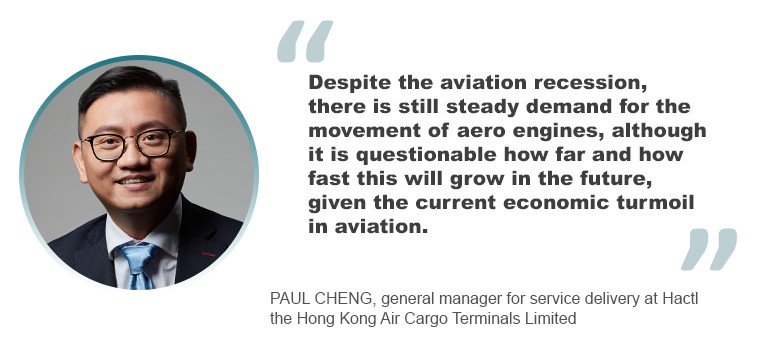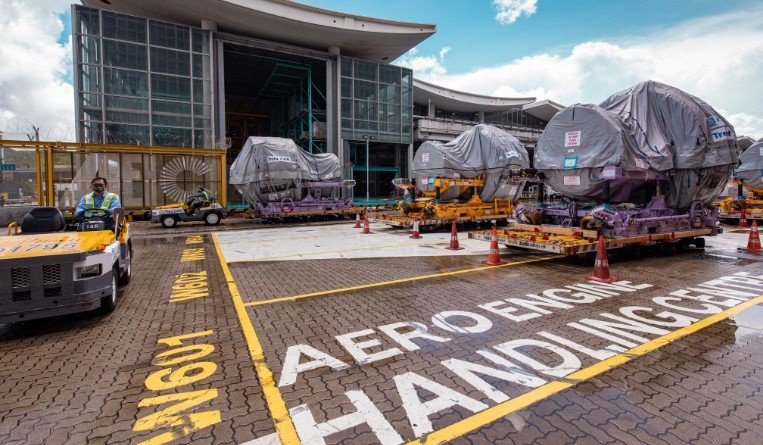Hong Kong Air Cargo Terminals Limited (Hactl) has established a new Aero Engine Handling Centre (AEHC) in a bid to increase Hong Kong’s involvement in the movement of aero engines.
Although current aviation conditions remain challenging, Hong Kong’s largest independent handler noted “steady demand” for movement of such machineries – as it noted factors putting the financial hub in a strong position to play a major role in moving aero engines.
“The expanded operation is now fully functional, and is successfully handling all our aero engine traffic,” Paul Cheng, general manager – service delivery of Hactl told Asia Cargo News. “Despite the aviation recession, there is still steady demand for the movement of aero engines, although it is questionable how far and how fast this will grow in the future, given the current economic turmoil in aviation.”
“But Hong Kong’s involvement in the Trent engine family, which is fitted to many of the most popular aircraft today, should ensure that this traffic is less impacted,” he added.
Hactl noted that Hong Kong is one of the only two locations in Asia that have certified repair, modification and overhaul facilities for Rolls-Royce Trent engines, used in the Airbus A330, A340, A350 and A380, as well as the Boeing 777 and 787 Dreamliner.
Cheng said Singapore is also a “significant centre for aero engine servicing and repair” in the region.
“What sets Hong Kong ahead of other airports for this traffic is its unrivalled facilities for freighter handling – particularly the Antonov An-124 which is increasingly being identified as an ideal transport for larger engines. It can carry five units without dismantling, compared to three on a 747F,” the Hactl executive added.
The independent cargo handler earlier said enhanced facilities and streamlined procedures in aero engine handling – such as its expanded AEHC service – can help attract more aero-engine traffic to and through Hong Kong.
Hactl’s new facility also complements its existing ability to process aircraft engines, which often weigh over 8 tonnes and are frequently valued at over US$20 million.
Hactl’s Cheng told Asia Cargo News that the cargo handler is putting “significant investment” into further expanding its aero engine handling capabilities including boost on “infrastructure, equipment, increased labour resource and additional training” for its staff.
Hactl noted that it is training additional staff specific to aero engine handling – and is also forming a dedicated aero-engine handling team.
“It’s a matter of in-house training based on many years’ experience of handling these large and very valuable items,” Cheng said. “This takes place in our dedicated hi-tech training suite and includes VR. It’s also backed up by very stringent procedures which we have now further tightened – such as operating every aero engine ramp movement with pilot vehicles both at front and back.”
Hactl said it has also installed an additional, dedicated outsize weigh-scale to facilitate double-checking of shipment weights in its new AEHC. Its enhanced aero-engine handling procedures also include the imposition of a 5kph towing speed limit.
Earlier, the cargo handler cited its capability to handle freighters of all kinds as another “strong advantage” in dealing with this specialized commodity.
“Aero engines are very large and heavy, but also delicate and among the most valuable commodities we process. We are upgrading all aspects of our handling to ensure we continue to provide the ultimate in efficient and safe handling while paving the way for potential future growth,” Cheng said.
“By enhancing Hactl’s capabilities for handling this highly-specialized and challenging cargo, we aim to enhance Hong Kong’s reputation as an important link in the global aero-engine maintenance and repair network. This should attract additional aero-engine business to Hong Kong and Hactl,” he added.
Aero-engine handling is already a big business for the handler – but Cheng said “given the vast scale of Hactl’s operations, it does not appear significant.”
“What is more important and relevant is the support we are providing to the Hong Kong aviation services sector, and to our freighter customers for whom this does represent significant revenue. It’s a key part of Hactl policy to develop capabilities that will assist our customers to exploit new revenue streams,” he added.
Investing for future demand
Looking ahead, Cheng said there’s no way of predicting the trajectory of aero engine transport given the current disruptions to aviation – nonetheless, he noted that Hactl is building its resources to be able to support demand when it comes.
“As handling agents, we can establish the necessary services and quality standards to facilitate new business, but we are then reliant on market conditions that are entirely beyond our control. That said, Hactl has always assumed a speculative policy of ‘build it and they will come,’ that policy has always worked for us,” he told Asia Cargo News.
“The future potential is difficult to assess during the current period of aviation recovery. Nobody really knows at present how the industry will look in five years’ time. What we can say is that Hactl will as always be ready for whatever demand there is,” Cheng added.
In 2019, the aircraft engine market was sized at almost US$80 billion but as the global interconnectedness increases, the industry is expected to reach over US$97 billion by 2026 amid expected increase in demand for air travel and cargo.




